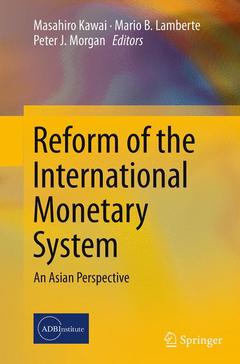Description
Reform of the International Monetary System, 2014
An Asian Perspective
Coordinators: Kawai Masahiro, Lamberte Mario B., Morgan Peter J.
Language: English
Subjects for Reform of the International Monetary System:
Publication date: 08-2016
Support: Print on demand
Publication date: 08-2014
259 p. · 15.5x23.5 cm · Hardback
Description
/li>Contents
/li>Biography
/li>Comment
/li>
Masahiro Kawai is professor, Graduate School of Public Policy, Tokyo University, Japan. He was dean and CEO of the Asian Development Bank Institute from 2007 to 2014, special advisor to the ADB president in charge of regional economic cooperation and integration, deputy vice minister for international affairs of Japan's Ministry of Finance and chief economist for the World Bank's East Asia and Pacific region. He was also professor of economics at the University of Tokyo after serving as associate professor at Johns Hopkins University. His recent publications focus on economic regionalism. He holds a BA in economics from the University of Tokyo and a PhD in economics from Stanford University.
Mario B. Lamberte is team leader, COMPETE Project, The Asia Foundation, Makati City, Philippines. Previously he was director of research at the Asian Development Bank Institute, the president of the Philippine Institute for Development Studies and advisor to the Philippine senate on legislative measures pertaining to financial markets and trade policy reforms. His current areas of interest are regional economic cooperation and integration, financial markets and development economics. He holds a PhD in economics from the University of the Philippines and did his post-doctoral studies at Stanford University.
Peter J. Morgan is senior consultant for research, Asian Development Bank Institute, Tokyo, Japan. Previously he served in Hong Kong, China as chief Asia economist for HSBC, responsible for macroeconomic analysis and forecasting for Asia. Before that, he was chief Japan economist for HSBC and earlier held similar positions at Merrill Lynch, Barclays de Zoete Wedd and Jardine Fleming. Prior to entering the financial industry, he worked as a consultant at International Business Information KK in Tokyo, specializing in financial sector consulting. His current research interests are macroeconomic and financial sector policy.
Provides a comprehensive overview of policy reforms of the international monetary system and Asian currency cooperation
Serves as a reference for policymakers, academics, subject experts, business leaders and civil society
Provides an analytical overview of currency coordination and policy cooperation in Asia and Europe based on lessons from the global financial crisis and the European sovereign debt crisis
Includes supplementary material: sn.pub/extras




